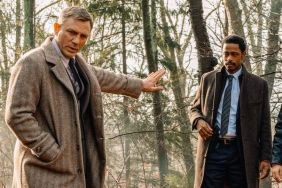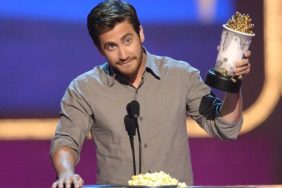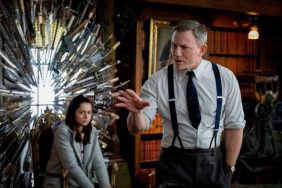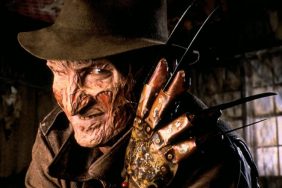
They say murder is the worst crime there is. Certainly the competition is rather small. Perhaps that’s why nobody wants to get caught doing it, and why catching a killer is the basis of countless stories. There’s something deliciously thrilling about finding someone who has committed the ultimate, damnable deed, and finding out why the hell they did it, and what everyone else around them had to hide in the process.
David Fincher’s Gone Girl may or may not be a murder mystery (you’ll just have to see the film to find out), but it sure got us thinking about the genre at Best Movie Ever. So we asked the CraveOnline critics – William Bibbiani, Witney Seibold, Fred Topel and Brian Formo – to scour their evidence box brains and come up with their picks for the single best murder mystery movie ever. No ifs, ands or buts. The best of the best.
What did they pick? And do you agree or disagree? Read on to find out, and to vote for some of your own favorite murder mystery movies at the bottom of the page.
Check Out: The Best Movie Ever: Stop-Motion Animation
Witney Seibold:

David Lynch once famously said that mysteries are no fun once you find out the answer. Sure, the moment of revelation can be fun (i.e. “YOU! It was you all along!”), but the real joy of a good murder mystery is that sense of being lost in an ever-deepening labyrinth of seemingly unconnected circumstances. Actually knowing whodunnit is far less interesting than the dead ends you run into figuring it out. And while you’re running into dead ends, looking for the one clue that will tip the truth into your lap, you begin to unravel. Obsession takes control. Your mind cannot think of anything beyond solving this unsolvable puzzle. The mystery becomes a great black beast that consumes you. After a while, knowing the truth becomes secondary to slaying that beast.
As such, the best murder mystery of all time is none other than Alfred Hitchcock’s Vertigo, recently declared the best movie of all time by the Sight & Sound poll. Vertigo is murder mystery, yes, but it’s also an elaborate plot about manipulation, obsession, reincarnation, suicide, and a liberal dose of sexual dominance. Most people approaching Vertigo for the first time may immediately note how dreamlike the film is; scenes intensely swoon into one another, the mystery that Scotty Ferguson (Jimmy Stewart) is investigating never making a huge amount of sense. Is Madeleine (Kim Novak) possessed by the spirit of a dead woman? Is she really suicidal? Why did Gavin Elster ask Scotty to follow Madeleine really? And was that really a suicide? And who is this mysterious redhead Judy (Novak) who looks exactly like Madeleine? Vertigo – film school perfect and relentlessly analyzed – plays like a dream of a typical noir, only giving you the truth when you step back a few paces.
I could go on and on about the film’s photography, the strange screenplay, the over-the-top performances, and its wonderfully melodramatic tone, but I will leave those things in the hands of the breathless essayists who have come before me. As it stands, Vertigo is part murder mystery, part nightmare, part sexual fantasy, and every bit a cinema classic.
William Bibbiani:

We are all of us hiding something, something that we really would rather other people not discover. So when a cop, a private detective or even just a plucky amateur sleuth takes it upon themselves to peel away the facades we build on top of our sticky shame, it’s frightening. Especially when they have the carte blanche that a murder investigation affords. Of course you can rummage through my porn stash, officer. We gotta find that killer. I don’t know where THAT magazine came from…
To my mind, the best murder mysteries are more about uncovering the secrets surrounding the murder than actually solving the danged murder. The world of “Twin Peaks” would never have been revealed to us if Laura Palmer hadn’t died. The unseemly and institutionalized sexism of The Silence of the Lambs wouldn’t have been thrown into sharp relief unless some maniac had been out there skinning women. But the apex of this is probably John Sayles’ Lone Star, an impeccably scripted, gorgeously complicated and beautifully acted story about a decades-old body that everyone wishes would have stayed buried.
Set in a small border town, Lone Star stars Chris Cooper as a Sheriff struggling to live up to the legacy of a father (Matthew McConaughey) everyone else loved. When the body of his father’s predecessor turns up in the desert, it falls to our protagonist to find out who really killed him, and make a series of fateful decisions in the process. Was his father the murderer? Would anyone care if he was? More to the point, would the loosely knitted fabric of this community fall apart were it not for the unethical decisions that divided father and son, but brought everyone else together?
Lone Star features a sprawling supporting cast, each of whom have beautiful adventures and developments all their own, and it’s got one HELL of a twist in there somewhere (I’ll never tell), but behind every reunion and revelation and redemption is a dead body. “Gotta be careful where you go poking’. Who knows what you’ll find.”
Fred Topel:

Six sequels can’t be wrong! But even if there weren’t a lucrative, and equally clever franchise spawned, the original Saw is a powerhouse debut for James Wan and Leigh Whannell. Saw is a serial killer tale told from the perspective of his latest victims. Jigsaw has gained notoriety for trapping his victims in elaborate deathtraps, you know, for moral reasons. Dr. Lawrence Gordon (Cary Elwes) and Adam (Whannell) wake up chained to opposite ends of a bathroom, with a hacksaw.
While they delay the inevitable (we know this only ends with one or both of them chopping a leg off), we learn what led Jigsaw to target Adam and Dr. Gordon, and how he’s tormented the cop (Danny Glover) pursuing his case as well as many other victims. Wan and Whannell weave an engrossing mystery about who will live and who will die, as well as who Jigsaw even is.
If you’ve seen any of the sequels, or even know who stars in them, then that is a spoiler for Saw 1. When I first saw it, it totally got me to the point I couldn’t believe how it played me. Really expert craftsmanship on the part of Wan to keep the intellectual game up with the visceral horror. It’s a balance to which all of the sequels would admirably aspire, with less success once Whannell left as writer, but the original Saw remains a masterpiece of mystery and surprise twists.
Brian Formo:

Zodiac, like loads of other films, could’ve easily landed on our big list of 100 ‘Guy Movies’ That Every Guy Should See because it gives us obsessed men (and a deplorable serial killer; maybe that’s why we steered away, didn’t want to think we were identifying with the Zodiac killer). But David Fincher’s meticulous opus will have to settle for a mention here as the Best Murder Mystery Movie Ever.
Fincher (and screenwriter James Vanderbilt) gives us two types of men: a man that every man wants to be and a man who wants to be him because he has more societal power to complete his task. They’re brought together by a maniac who’s killing young couples and taunting the police and journalists in post-Summer of Love San Francisco. One, Robert Graysmith (Jake Gyllenhaal), is a cartoonist for the San Francisco Chronicle. He’s drawn to the crime reporter at the paper, Paul Avery (Robert Downey, Jr.), and Avery enjoys the attention he gets for his write-ups of the killings, but when the killer directly threatens him, Avery quits. Graysmith’s obsessive attention shifts to Detective Toschi (Mark Ruffalo), a brash, good looking detective, whom Hollywood modeled Steve McQueen’s character in Bullitt after. Toschi and Graysmith both stick with the case, and all the clues, while their colleagues drop away. Toschi is fixated and diligent on the case. But Graysmith is ultimately impotent because of his paid role in society. When Graysmith sees who he and Toschi believe is the chief suspect in the case at a supermarket, all he can do is stare. Because he’s not a cop. He’s a cartoonist. And we can’t all become vigilante heroes, or arrest on a hunch.
Fincher brilliantly juxtaposes the (more real) procedural impotence of hunch justice by contrasting it with mentions/scenes from Bullitt and Dirty Harry. Movies that end at the moment the hero cop/investigator kills the opposition and their superiors don’t know where they are. And they are correct about who the bad guy is. Cinema is felt throughout Zodiac (it also was a game-changer for digital cinematography, done by the late, great Harris Savides), as couples escape to the movies to avoid necking in the woods or vistas. But the killer is also is a fan of cinema. He writes, in a taunting letter: “Waiting for a good movie about me. I wonder who will play me?” Well, a great movie was made about people obsessed with apprehending the Zodiac killer, but not about the killer himself. Keep waiting, mysterious asshole.








